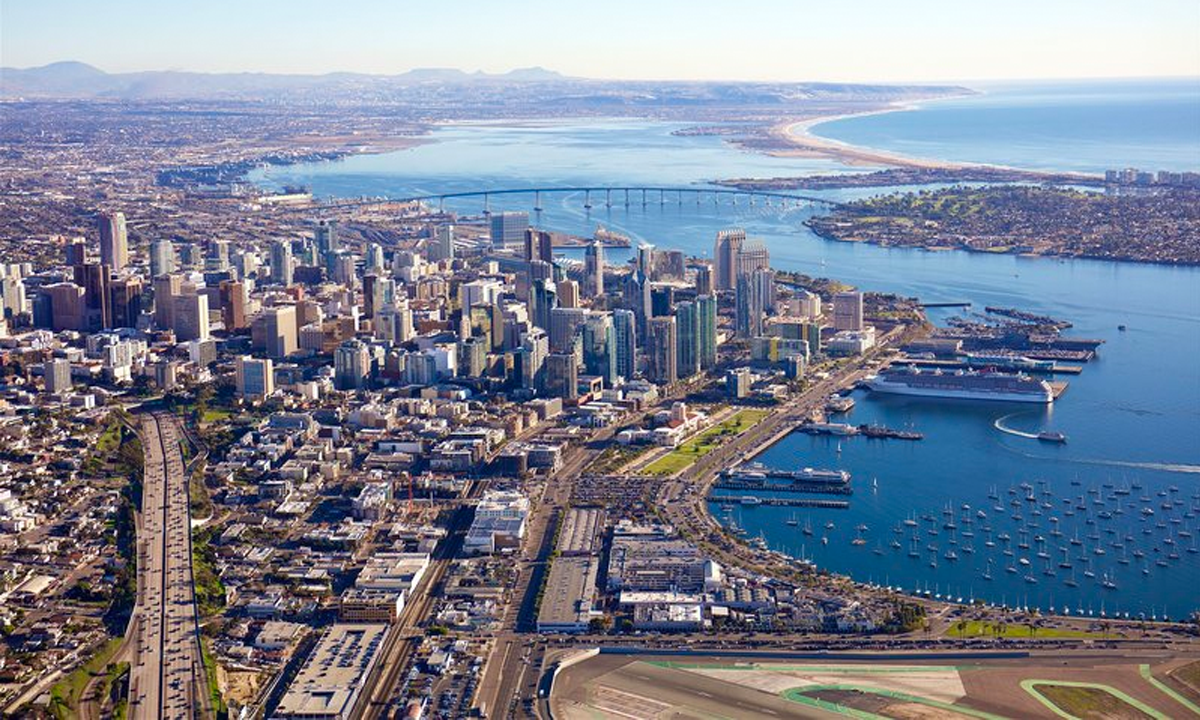First posted by San Diego Community News Group
The Port of San Diego is making significant moves to advance new clean air and environmental justice strategies. During its Feb. 11 meeting, the Board of Port Commissioners approved a resolution to support development of the County of San Diego’s Regional Carbon Sustainability Plan, approved a memorandum of understanding (MOU) with The San Diego Foundation focused on climate and coastal resiliency efforts, and received an update from staff on development of the Port’s Maritime Clean Air Strategy (MCAS) to identify and prioritize projects to further reduce emissions and improve air quality on and around San Diego Bay.
“The Port is committed to being a leader in cleaner air for our communities. At the start of the year, I made it clear that air quality and climate change issues will be important drivers in any effort, project or major deal we pursue and support over the next decade,” said chairman Michael Zucchet, Port of San Diego Board of Port Commissioners. “Supporting these initiatives are prime examples of how the Port continues to make progress by collaborating with regional partners to deploy new strategies and technologies.”
The Port has long collaborated with its member cities, the County of San Diego, academia, and others throughout the region to advance climate adaptation initiatives. These latest efforts are in addition to the Port’s Climate Action Plan, Port Master Plan Update, and others that establish goals and strategies for reducing the Port’s environmental impacts.
Maritime Clean Air Strategy
As an extension of the Port’s Climate Action Plan, the Maritime Clean Air Strategy (MCAS) will identify and prioritize projects to further reduce emissions and improve air quality. The MCAS is community-focused with bi-monthly meetings for the exchange of knowledge, ideas, and goal setting. The MCAS is also intended to help clarify the role the Port can play in supporting the Port’s maritime tenants and terminal operators with transitioning to zero and near-zero technologies.
Recent maritime efforts include the demonstration of electric trucks and cargo handling equipment at both of the Port’s terminals, shore power at cruise and cargo terminals, and a designated truck route to keep commercial trucks out of Barrio Logan neighborhoods. The MCAS and the AB 617 Community Emission Reduction Program are complementary efforts, and each informs and supports one another. Port staff anticipates presenting a final draft of the MCAS for the Board’s consideration in the spring. For more information, read the Feb. 11 staff report here.
Regional Carbon Sustainability Plan
On Jan. 27, the San Diego County Board of Supervisors voted unanimously to develop a framework to reach net-zero carbon emissions by 2035, ten years before the State of California’s carbon neutrality goal. The Regional Carbon Sustainability Plan is the first of its kind for the region and will be developed in partnership with the University of California, San Diego School of Global Policy and Strategy.
The Port is one of many agencies in the region set to collaborate and support the plan that could make San Diego the largest county in the U.S. to commit to achieving such a goal by 2035. As a stakeholder, Port staff will contribute by providing information on sources of emissions that are unique to the Port such as goods movement vessels, vehicles and equipment.
“The Port’s contributions to the development of the Regional Carbon Sustainability Plan will be essential as there are important industries that only exist on the San Diego bayfront,” said vice chair Nora Vargas, San Diego County Board of Supervisors, who crafted the plan along with Supervisor Terra Lawson-Remer and whose district includes much of the San Diego Bay waterfront. “This policy, developed in collaboration with the Port and other agencies, will incorporate strategies tailored to the region to achieve zero carbon in key sectors including energy, transportation, and land use. These strategies will help to reduce the burden on low-income communities, especially communities of color, while also providing good-paying jobs building the infrastructure that will propel the region into the future.”
In addition to reducing GHG emissions, the plan will have co-benefits to public health and quality of life in the region, which complement the Port’s planning initiatives and climate goals. For more information, read the Feb. 11 staff report here
Memorandum of understanding with The San Diego Foundation
The Port and The San Diego Foundation have entered into a memorandum of understanding to advance a collaborative partnership to explore opportunities for program alignment and investment to support coastal access, climate initiatives and coastal resiliency, environmental conservation and stewardship, environmental justice, and a thriving, sustainable waterfront.
“As regional leaders, the Port of San Diego and The San Diego Foundation embrace our commitment to improving quality of life in our communities,” shared Mark Stuart, president and CEO of The Foundation. “San Diegans will benefit from our new partnership with equitable access to and enjoyment of a safe, healthy, resilient coastal environment.”
The San Diego Foundation has been an active participant on the Port’s Environmental Advisory Committee since its inception in 2006. In addition, the Port and The Foundation have long worked together to improve quality of life in the region and provide public benefits through various projects including the creation of Ruocco Park, the San Diego-Coronado Bay Bridge Lighting project, the Port with No Borders Scholarship Fund, and a climate initiative called “San Diego, 2050 is Calling.”
For more information on this latest partnership, read the Feb. 11 staff report here




